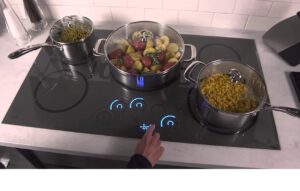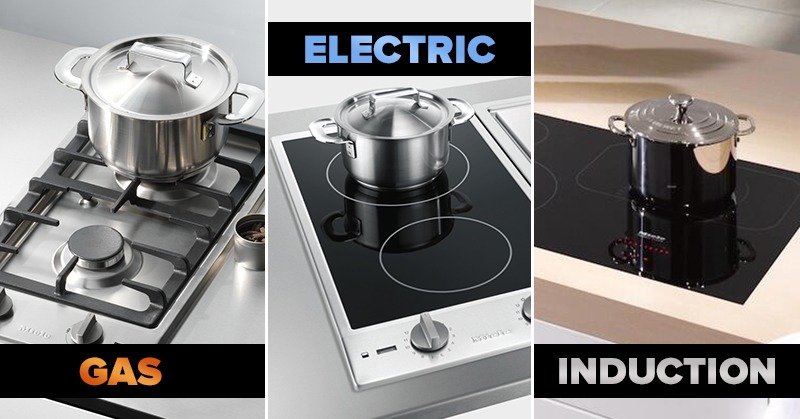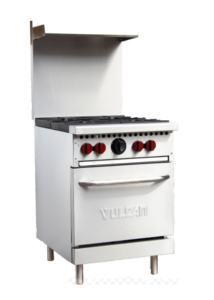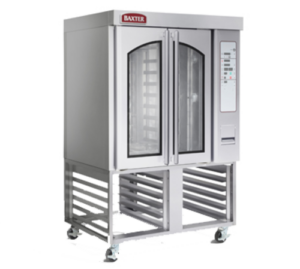When preparing a meal, the type of cooktop you use may be just as important as your choice of cookware. Most people are familiar with and often use gas or electric cooktops. There’s also induction cooking, which has its own list of pros and cons. Today, we will go over gas, electric, and induction cooktops to help you decide which you would like to have in your home based on your culinary needs. Read on to learn more about each type.
Gas Cooking
Cooking with gas offers a sense of familiarity since many people have grown up using this kind of range and may still use it today. Gas ranges are usually a favorite among chefs and home cooks. Gas cooktops include an open flame both on the stovetop as well as inside the oven. The stovetop contains burners of various sizes that each offer their own heat level. This allows you to melt, simmer, and fry food with ease. The flame located inside of the oven turns on and off to maintain ideal cooking temperatures.
If you are considering purchasing a gas range, keep in mind that they require a dedicated gas line so you may need to get one installed by a professional.
What are the Advantages of a Gas Cooktop ?
Adjustable stovetop heat
Expanded cooking techniques
Quick burner cooldown
Manual ignition option
What are the Disadvantages of a Gas Cooktop?
Your kitchen will surely heat up
A gas cooktop emits lots of radiant heat that spreads throughout the kitchen and even the rest of the house. However, you can reduce the heat by purchasing a range hood.
The cleanup
The grooves around the burner may be harder to clean for some people. Additionally, you must remove and scrub the grates if you want a thorough clean.
Higher utility cost
Though you can cook fairly quickly with gas, it will also be more expensive that other options. This is especially true if the gas range requires a constant flow of gas.
Electric Cooking
Electric range stovetops are usually flat surfaces made a ceramic-glass blend. They include heated metal coils that transfer heat to the cookware. The coils also heat the inside of the oven consistent temperatures.
What are the Advantages of an Electric Cooktop?
Inexpensive
Responsive and precise oven heat
Dry oven heat
Stovetop space
Your kitchen stays clean
Easy cleanup
What are the Disadvantages of an Electric Cooktop ?
It’s dependent on electricity
An electric cooktop needs, of course, electricity to function. In the power goes out, you have nothing to cook on until the power comes back.
Easily damaged
Though a smooth cooktop is easier to clean, it is also more prone to scratches. There’s also the possibly of cracking if touched by cold water while hot.
Stays hot
Electric elements can get really hot. They heat can stay for a while even after everything is turned off. Be careful not to burn yourself.
Induction Cooking

What are the Advantages of an Induction Cooktop?
The food is cooked quickly
You are less likely to get burned
Energy efficient
What are the Disadvantages of an Induction Cooktop?
Dependent on electricity
Expensive
Conductive cookware is required
Induction vs. Gas Cooktops
- When it comes to familiarity, most people will choose gas every time. Induction cooking is more recent, and it may take some time to get used to. Most chefs prefer to stick to what they already know.
- Gas cooktops also give a clearer visual indication of heat levels.Induction has LED “flames”, but that isn’t always the easiest to work with while cooking.
- Induction significantly more efficient than gas. This means your kitchen will be cooler with induction. Also, food cooked with induction receives 90% of the heat generated, as opposed to only 40-55% for gas.
- Induction is safer than gas since there is no open flame to be aware of. This decreases the risk of burns or accidental fires.
- Induction appliances tend to be more expensive up front. However, their lifespans make up for the costs. Gas appliances may empty your pockets a bit if you have to install a gas line. Another factor to consider is that induction only works with certain pots and pans. If you do not already have cookware made of specific materials, you would have to buy some.
Induction vs. Electric Cooktops
- Electric and induction cooking are similar, but there are still some differences. For one, induction offers more direct control over heat.
- Though electric is very efficient with energy, induction is a clear winner. Induction allows 90% of heat to reach food while electric cooking allows only 65-70%.
- Induction is still the safest cooktop to work on, since the pan itself is the only heat source.
- In terms on money, electric cooking is more friendly to your budget. Plus, you will not need to purchase any special cookware for your electric stovetop.
Electric vs. Gas Cooktops
- Though gas cooktops can heat up rather quickly, they tend to emit more heat into the atmosphere. Electric cooktops, on the other hand, leave you kitchen cooler.
- The open flame of gas allows you to char and grill foods.
- When it comes to cleanup, electric wins. It has a flat surface, no crevices, and no grates to lift.
- Induction cooktops are more efficient that gas. However, gas heat uses less energy. Additionally, a gas stovetop can always be used during a power outage while electric cannot.






